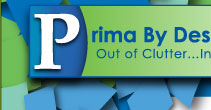|
|
|
|
|
|
|
|
|
|
|
|
||||
 |
 |
|
||||
 |
Monthly Tip NEW BEGINNINGSThis month’s newsletter is about rebirth and new beginnings. When looking at this from an organizing standpoint, it means finding new uses for old items, and changing your habits. In other words, rather than throwing something away, then giving in to the impulse to purchase something new to replace it, why not think about how you can live without that item, repair it, or find another use for it? Below are some ideas that are more prevention and maintenance than they are actions. This article is not about how to organize what you have. It’s all about looking at your possessions from a new perspective and living within those parameters. BUY NOTHING NEW Perhaps you have heard of groups that are springing up across the country that agree to buy nothing new for one year. Of course this does not include food or sundries necessary to live a healthy life. You are allowed to buy food, toiletries and other consumables. What this group focuses on is the material goods we have in our homes—the stuff. Take a quick glance around your room as you read this. Perhaps you are at the kitchen table reading this on-line. Maybe you are in your office. Or maybe you are sitting in the family room with your laptop while catching up on your favorite television programs. Where ever you are, look around the room. Do you have 200-plus DVDs on your shelves? Perhaps you have a toaster oven, a toaster and a grill master on your kitchen counter. Maybe you have the last twelve issues of three different magazines piled in a corner. Now think to yourself—do I really need all those items? Do I use all of them? Have I seen every single movie on that shelf? Have I read every magazine? Have I toasted any bread or bagels lately? What would I do if any of these items broke or disappeared from my home? When we purchase these items, we think we need it. We can’t live without it, otherwise why would we buy it? But if one hundred of your DVDs went missing, admit it—couldn’t you live without them? Even if one of your favorite movies was among the missing, what’s to stop you from running to the store to rent it, or better yet, to the library to borrow it for free? And what if you stopped getting those three magazine subscriptions? Can’t you go to the library to check them out? Or why even go out? Why not read them on line? Especially since you never have the time to catch up on them anyway, why should they be there cluttering up your space? And if your toaster broke down today, can’t you use the toaster oven? Or can’t you take it in for repair? It may surprise you to learn that these groups of people not only survived buying nothing new, but they extended their pledge for another year. So how DO you live within these parameters? How can you change your lifestyle and start a new life? RE-USE OR RE-PURPOSE WHAT YOU HAVE Before you throw something away or donate it, think hard about that item. Does it serve a purpose somewhere else in the house? Can it be re-used in another area of the home? For example, you’re about to throw away old, faded bed sheets. The following week, your spouse is running to the hardware store to purchase tarps for the painting you asked him to do in the living room. Those old sheets would have been perfect for covering furniture or the floor. Or how about those old baby food jars? You throw them in the recycle bin, then the next day you find a new compartmentalized box sitting on your spouse’s work bench. It’s filled with nails and screws—all little items that could easily have been sorted and stored in those jars and stacked on shelves. Now don’t get me wrong. I am not supporting the idea of saving every little thing in your home. That only creates clutter. What I am saying is that you should think hard before putting that old dresser on the driveway for the trash collector. Maybe it is scratched and a drawer is broken. But does that matter in the garage? Could you find a use for it in the basement or shed before sending it to the landfill?
REPAIR BROKEN ITEMS
BUY USED Professional Organizers are in the business to clear the clutter from people’s homes. But part of the learning process is trying to figure out why your home got the way it did, and what can you do to remedy the situation so that it doesn’t happen again? Often, the answer is above. Changing your habits will change your lifestyle. And by learning to live with less, you’ll have less to take care of on a daily basis. Wouldn’t it be nice to reclaim that time?
|
|||||
| |
||||||
| |
||||||
| |
||||||
| |
||||||
| |
||||||
| |
||||||
| |
||||||
| |
||||||
|
|
||||||
|
|
|
|
|
|
||
|
Home | About Us | Services | Examples | Newsletter | Resources | Products | Speaking | Contact Us Site Design by: Base Zero Productions |